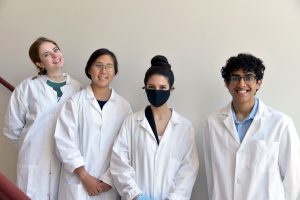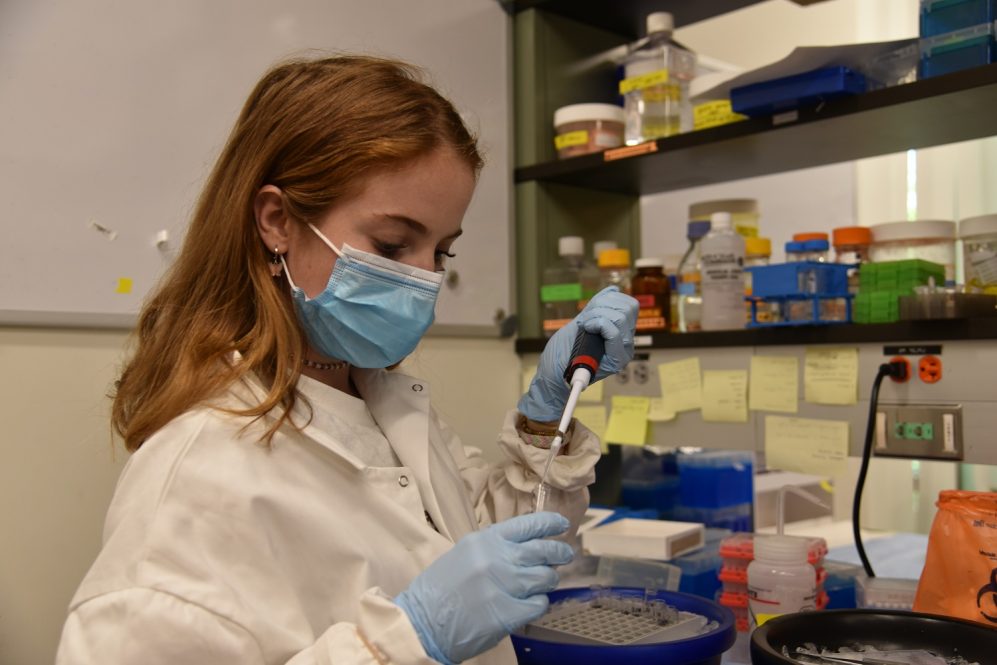This summer Abigail “Abby” Interrante ‘23 (CAHNR) isn’t taking it easy at the beach. She’s logging hours in the lab, trying to determine if a transgenic mouse model can be used to study fatty liver disease in humans.
Interrante is one of this year’s recipients of the Margaret J. Ware Scholarship for Nutritional Sciences Excellence in Undergraduate Research.
The scholarship supports undergraduate students who conduct research under the direction of faculty in nutritional sciences. Other recipients are Dave Patel, Paige Dossias, and Rachael Woodruff.

For her summer research experience, Interrante is working with Ji-Young Lee, professor and head of Department of Nutritional Sciences.
“We are thrilled that Abby and the other Ware Scholarship recipients are gaining valuable experience in human nutrition,” says Lee. “Thanks to this generous gift, our department is helping to train future leaders in this critical field of human health.”
Interrante, who is a nutritional sciences and molecular and cell biology double major, joined Lee’s lab in October 2021, seeing it as a perfect opportunity to explore her joint interests in nutrition and molecular biology.
“I’m really interested in nutrition as well as molecular biology and this lab, it just connects both of those so incredibly well and I get to follow both of my interests and passions at once,” Interrante says.
For her summer research, Interrante has been looking at transgenic mouse models. “Transgenic” means scientists genetically edited the mouse genome to add genes not normally found in their DNA. In this case, her mouse model contains genes that make mice have similar lipoprotein metabolism to humans: cholesterol ester transfer protein (CETP) and apolipoprotein B (ApoB).
Non-alcoholic fatty liver disease refers to a condition where fat builds up in the liver, usually caused by a diet high in fat. This condition can lead to liver fibrosis, cirrhosis, or even liver failure.
CETP helps transfer cholesterol and triglycerides from low-density lipoproteins (LDL) to high-density lipoproteins (HDL) in exchange with triglycerides. ApoB helps LDL, commonly known as “bad” cholesterol, dock at different body tissues and transfer cholesterol into those tissues.
“We hypothesize these genes will enable mice, when fed a really fatty diet, to model the induction of fatty liver disease in the way humans develop it,” Interrante says.
Interrante is looking at known hallmarks of fatty liver disease like lipid accumulation, scarring on the liver, and insulin resistance to determine the success of this experiment.
Interrante says that preliminary results suggest the transgenic mice are a useful model, but there may be sex-related differences.
Interrante’s goal is to determine if the mice will develop fatty liver disease in a way that models how humans do. This will pave the way for new studies and, eventually, treatments.
“Once we have the best model for diet-induced fatty liver disease, we can then go on to study interventions,” Interrante says.
Interrante is grateful for the support the Ware Scholarship has provided in her UConn education. She says that this summer she has learned many valuable research lessons and has also been able to impart some of her knowledge to newer undergraduate students in the lab.
“It’s really interesting for me, being an undergrad and still learning, but as I’m learning I’m also beginning to teach others knowledge I’ve gained,” Interrante says. “Teaching is also such a valuable learning experience. It’s really fun to get that opportunity too.”
The Ware scholarships were funded by a generous bequest from Margaret J. “Peggy” Ware ’48.
Follow UConn CAHNR on social media



